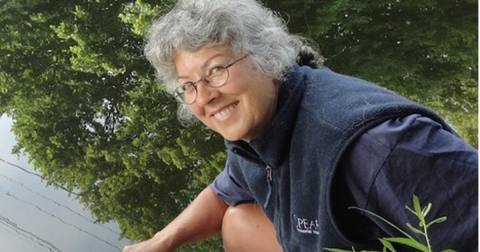
Lisa Doner’s curiosity about the earth has made her both a student of change and a professor specializing in what causes it.
An associate professor in Plymouth State’s Environmental Science and Policy Program and the University’s Center for the Environment, Doner studies lake sediments to determine past watershed changes and what causes them. She is also spearheading an experimental project at PSU to determine whether arrays of mirrors can deflect the sun’s rays enough to create a measurable environmental change, a venture with the potential for global implementation.
She says her professional “aha” moment came years ago. “I realized that climate went from being something of an intellectual interest to being an essential component of human survival.”
Change has been a constant theme in Doner’s life, starting with her growing up in a military family at various Air Force bases throughout the country. She earned bachelor’s degrees in ecology and evolutionary biology and in geology at the University of Arizona.
“I started taking these classes and everything I knew from ecology had relevance in geology, only it was a different time scale,” Doner explains. “I was able to take what had happened in the biosphere eons ago and apply it to the present and what might happen in the future. It was like being a time traveler.”
She spent time at a variety of jobs—including field work involving underwater archeology—before getting a Master of Science degree in quaternary studies at the University of Maine and, ultimately, a PhD in geology from the University of Colorado.
Doner’s studies in lake sedimentation have taken her to Utah, Maine, Baffin Island, and Turkey, and she continues to work with lake associations to investigate water quality, trends, and problems. “We are in a time of very rapid change in the nature of our lakes,” she says, with more organic and less mineral material in them, likely because of human change that began with the Industrial Revolution. That has meant more algal blooms that can cause everything from depletion of oxygen levels to secretion of toxins in the water.
“What I tell my students about these hard issues is that the good news is these changes are not being forced upon us by some external entity. Because we (humans) created it, it’s within our power to reduce it and we have an obligation, I believe, to do that.”
A PSU instructor since 2007, Doner has won the admiration of students like Nicholas Liston, for whom she helped develop an internship project at Wells Ocean Rescue in Maine that focused on professional leadership skills training.
“She genuinely cares for my success in school and life,” says Liston, “She will definitely be one of the people who I will remember and be grateful to have worked with.”
Doner’s recent endeavors include the mirror project and one aimed at increasing students’ digital literacy to help them meet the demands of the workplace. She is applying for a five-year, $2 million grant from the National Science Foundation to implement the program at several universities and tribal colleges.
An international traveler who loves to scuba dive in Honduras and the Sea of Cortez, Doner is active in several conservation groups and takes frequent hikes with her Chinook dogs.
“I want the wake of my passage through this life to be one that stirs the water, brings new ideas and opportunities into being, and creates eddies and currents with both unexpected and delightful consequences,” she says. “To change is to evolve. I want to help humanity evolve.”

